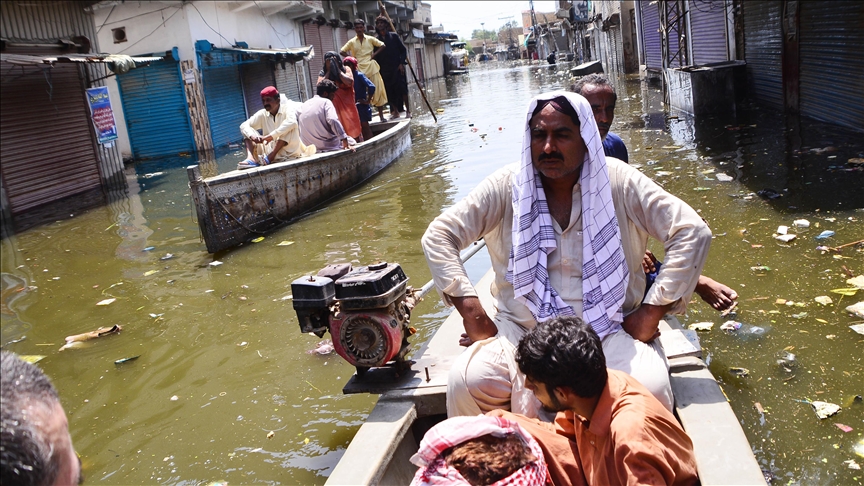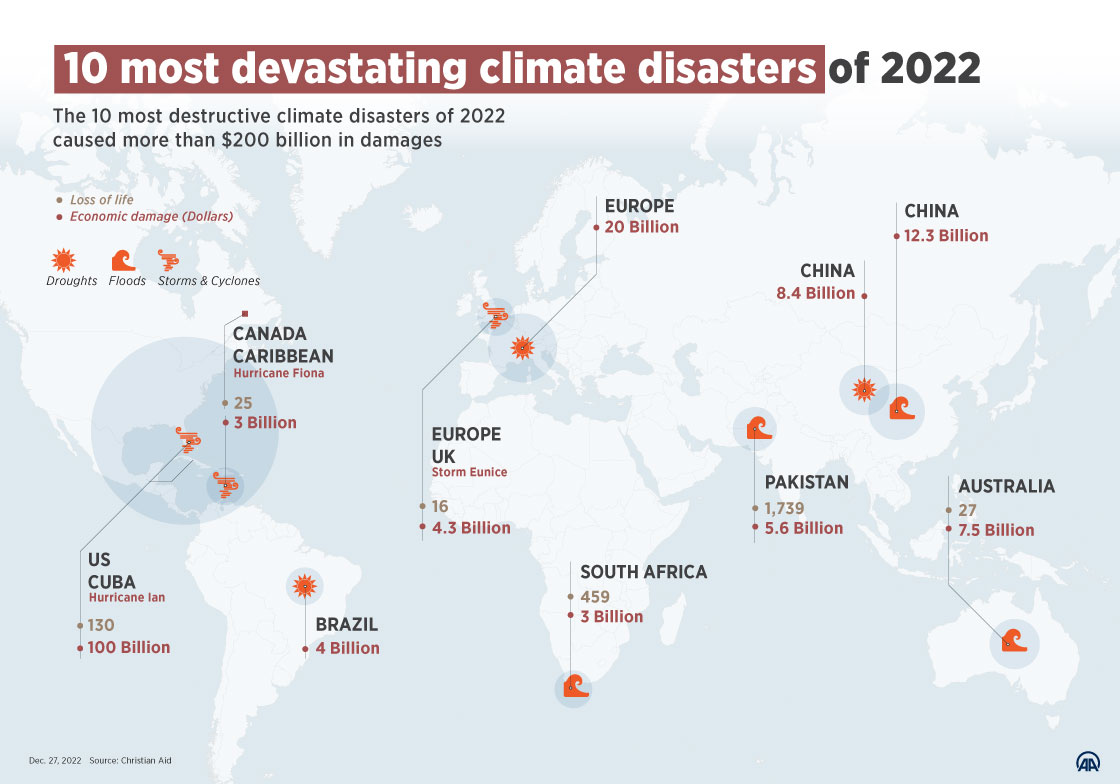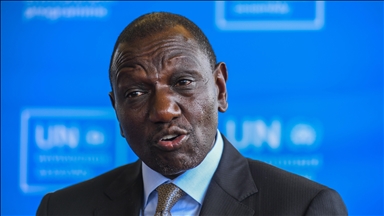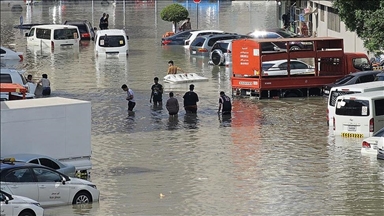10 costliest climate disasters in 2022 cause at least $200 billion as human suffering remain uncounted
Report shows floods, cyclones, droughts kill thousands while displacing millions across globe in places which have done little to cause climate crisis
 Pakistani flood victims are being evacuated to a safer place following flash flood in Daddu district southern Sindh province, Pakistan, on September 07, 2022. Record monsoon rains and melting glaciers in Pakistan's northern mountains have brought floods that have affected 33 million people and killed at least 1,314, including 458 children, Pakistan's National Disaster Management Agency said. ( Farhan Khan - Anadolu Agency )
Pakistani flood victims are being evacuated to a safer place following flash flood in Daddu district southern Sindh province, Pakistan, on September 07, 2022. Record monsoon rains and melting glaciers in Pakistan's northern mountains have brought floods that have affected 33 million people and killed at least 1,314, including 458 children, Pakistan's National Disaster Management Agency said. ( Farhan Khan - Anadolu Agency )
ISTANBUL
The ten most financially destructive climate disasters in 2022 cost at least $200 billion while causing extreme human suffering from food insecurity, drought, mass displacements and the loss of life.
Each of the 10 costliest extreme events influenced by the climate crisis caused more than $3 billion in damage, according to a study by Christian Aid, "Counting the Cost 2022: A Year of Climate Breakdown," that was published Tuesday.
But as most of the estimates are based only on insured losses, the true financial costs are likely to be higher as the human costs are often uncounted.
The study shows the costs are usually higher in richer countries as they have higher property values and can afford insurance.
Some of the most devastating weather events this year, however, hit poorer nations which have "contributed little to causing the climate crisis and have the fewest buffers with which to withstand shocks," according to Christian Aid, a relief and development agency based in the UK and Ireland.
"No corner of the globe was spared from the costliest climate impacts in 2022 with all six populated continents represented in the top 10," it said.
"Having ten separate climate disasters in the last year that each cost more than $3 billion points to the financial cost of inaction on the climate crisis. But behind the dollar figures lie millions of stories of human loss and suffering. Without major cuts in greenhouse gas emissions, this human and financial toll will only increase," CEO Patrick Watt was quoted as saying in the report. "The human cost of climate change is seen in the homes washed away by floods, loved ones killed by storms and livelihoods destroyed by drought. This year was a devastating one if you happened to live on the front line of the climate crisis."
Hurricane Ian, which struck the US and Cuba in September, is estimated to have the highest cost, reaching at least $100 billion, while displacing 40,000 people.
According to World Bank estimates, floods taking in Pakistan from June to September, caused $30 billion in damage, displacing 7 million and killing more than 1,700 people.
However, due to the difficulty in obtaining insurance, only $5.6 billion of the losses were covered, according to the report.
Europe ravaged by heatwaves and drought
The summer heat wave and drought ravaging the UK and Europe cost more than $20 billion in losses while floods in China during the summer cost at least $12.3 billion, displacing 239 people.
Europe is responsible for about 18% of human-caused greenhouse gas emissions, said the report.
Floods affecting Australia, from Feb. 23 to March 31, led to a loss of at least $7.5 billion and forced more than 60,000 to move, said Christian Aid.
February's Storm Eunice in Europe and the UK cost more than $4.3 billion, leading to 16 deaths while Hurricane Fiona in the Caribbean and Canada in September caused losses of more than $3 billion in two weeks. Hurricane Fiona displaced over 13,000 people with 25 deaths.
"The UK did not escape the ravages of climate change in 2022 with both Storm Eunice and the summer heatwave taking their toll. These set both a new UK windspeed record and highest temperature record. This underlines the need for policies to accelerate the transition to net zero and the folly of the decision to open a new coal mine in Cumbria," said Watt.
The UK gave the greenlight for its first new coalmine projects after three decades this month in Cumbria, despite objections in the country, around the world and despite climate pledges.
The US, Canada and Australia are among the biggest polluters as per person carbon emissions while South Africa and China are the world's largest coal producers.
Floods in South Africa in April caused over $3 billion in economic damage, displaced more than 40,000 and killed 459.
The economic damage of the drought, which effects lasted the entire year in Brazil and China, was calculated as $4 billion and $8.4 billion, respectively.
Christian Aid urged world leaders to decide how the loss and damage fund is managed and get money flowing into it as the extreme events highlight the need for more urgent climate action. The fund was recently agreed to at the UN Climate Conference COP27.
2023 needs to be the year we all wake up
A second list of 10 climate disasters in the report highlights those which do not make the list of insured losses but were just as damaging to communities or posed worrying future threats.
The report said West African floods in Nigeria, Cameroon, Mali and Niger in October led to the death of more than 600 people and the displacement of 1.3 million while Cyclone Sitrang in Bangladesh displaced 1 million.
"It is sobering to see the full extent of climate breakdown the world has suffered from in 2022. Whether it be cyclones and floods or droughts and heatwaves, it is clear that the crisis is getting worse. This report shows, in the starkest terms, why urgent climate action is so vital in 2023," Mohamed Adow, director of the Nairobi-based energy and climate think tank, Power Shift Africa, said in a statement.
"We need to see the phasing out of fossil fuels, an acceleration of renewable energy and greater support for the vulnerable. Here in Africa, we are seeing the suffering that climate change is causing to those that have done the least to cause it. 2023 needs to be the year we all wake up and start to put the world on the right track."
The drought in the Horn of Africa makes the list as it is estimated to have affected 36 million people, according to the UN Office for the Coordination of Humanitarian Affairs.
Floods in Malaysia and Petropolis in Brazil displaced 70,000 and 1,400, respectively, and 850,000 people had to move due to Tropical Storm Nalgae in the Philippines.
Heatwaves in India and Pakistan in March and April, back-to-back storms in Southeast Africa, Tierra del Fuego wildfire in Chile and Arctic and Antarctic heatwaves are among climate disasters affecting the lives of thousands and posing threats to the future of climate.
Shouro Dasgupta, a researcher at RFF-CMCC European Institute on Economics and the Environment and a lecturer at Universita Ca' Foscari Venezia, pointed to the effects of climate change on food security.
"Climate change is already undermining global food security, exacerbating the effects of the COVID-19, geopolitical, energy, and cost-of-living crises. Given the increased frequency and intensity of extreme events such as heatwaves and droughts in 2022, the impacts on food security are likely to be even higher," he said in the report.
Anadolu Agency website contains only a portion of the news stories offered to subscribers in the AA News Broadcasting System (HAS), and in summarized form. Please contact us for subscription options.







